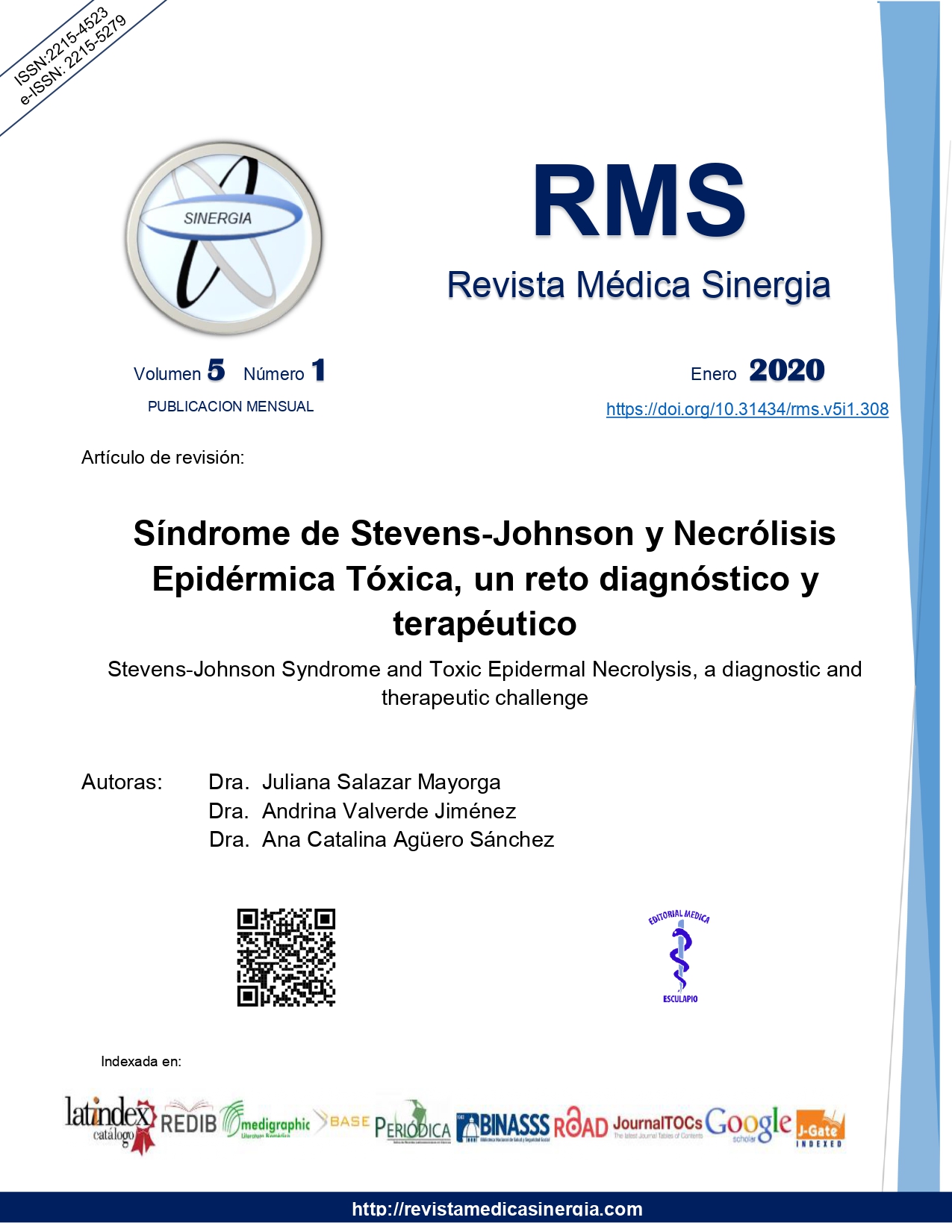Abstract
Stevens-Johnson Syndrome and Toxic Epidermal Necrolysis are severe mucocutaneous diseases with high morbidity and mortality. They are part of a spectrum of severe adverse cutaneous drug reactions, differing only by their extent of skin detachment. Medications are the main trigger usually at the beggining of treatment. The agents commonly involved may vary according to the population and their genetic differences. The pathophysiological mechanisms involved are not fully clarified, however the participation of granulisin, the Fas signaling pathway and inflammatory cytokines has been demonstrated. Patients with Stevens-Johnson Syndrome or Toxic Epidermal Necrolysis are at high risk of developing bacterial infections that could lead to sepsis and other complications. The diagnosis requires a clinical-histopathological correlation and its management is mainly based on the suspension of the causative agent and the early aggressive supportive care. There is evidence that suggests the beneficts of immunomodulatory systemic therapies, but further evaluation in prospective studies is required.
Keywords
References
Martínez S, Gómez M, Ocampo J. Actualidades en farmacodermias severas: síndrome de Stevens- Johnson (SSJ) y necrólisis epidérmica tóxica (NET). Gac Med Mex. 2015;151:777-87. https://www.anmm.org.mx/GMM/2015/n6/GMM_151_2015_6_777-787.pdf
Frey N, Jossi J, Bodmer M, Bircher A, Jick SS, Meier CR, Spoendlin J. The Epidemiology of Stevens-Johnson Syndrome and Toxic Epidermal Necrolysis in the UK. Journal of Investigative Dermatology. 2017 06;137(6):1240-1247. https://doi.org/10.1016/j.jid.2017.01.031
Hsu DY, Brieva J, Silverberg NB, Silverberg JI. Morbidity and Mortality of Stevens-Johnson Syndrome and Toxic Epidermal Necrolysis in United States Adults. Journal of Investigative Dermatology. 2016 07;136(7):1387-1397. https://doi.org/10.1016/j.jid.2016.03.023
White KD, Abe R, Ardern-Jones M, Beachkofsky T, Bouchard C, Carleton B, Chodosh J, Cibotti R, Davis R, Denny JC, Dodiuk-Gad RP, Ergen EN, Goldman JL, Holmes JH, Hung S, Lacouture ME, Lehloenya RJ, Mallal S, Manolio TA, Micheletti RG, Mitchell CM, Mockenhaupt M, Ostrov DA, Pavlos R, Pirmohamed M, Pope E, Redwood A, Rosenbach M, Rosenblum MD, Roujeau J, Saavedra AP, Saeed HN, Struewing JP, Sueki H, Sukasem C, Sung C, Trubiano JA, Weintraub J, Wheatley LM, Williams KB, Worley B, Chung W, Shear NH, Phillips EJ. SJS/TEN 2017: Building Multidisciplinary Networks to Drive Science and Translation. The Journal of Allergy and Clinical Immunology: In Practice. 2018 01;6(1):38-69. https://doi.org/10.1016/j.jaip.2017.11.023
Nguyen, D. V. et al. HLA-B*1502 and carbamazepine-induced severe cutaneous adverse drug reactions in Vietnamese. Asia Pacific Allergy 2015;5: 68-77. http://dx.doi.org/10.5415/apallergy.2015.5.2.68
Wang Q, Sun S, Xie M, et al. Association between the HLA-B alleles and carbamazepine-induced SJS/TEN: A meta-analysis. Epilepsy Res 2017; 135:19. http://dx.doi.org/10.1016/j.eplepsyres.2017.05.015
Wang Y, Chen C, Tassaneeyakul W, Saito Y, Aihara M, Choon SE, Lee HY, Chang MM, Roa FD, Wu C, Zhang J, Nakkam N, Konyoung P, Okamoto-Uchida Y, Cheung CM, Huang J, Ji C, Cheng B, Hui RC, Chu C, Chen Y, Wu C, Hsu C, Chiu T, Huang Y, Lu C, Yang C, Lin Y, Chi M, Ho H, Lin J, Yang C, Chang Y, Su S, Wang CW, Fan W, Hung S, Chung W, . The Medication Risk of Stevens-Johnson Syndrome and Toxic Epidermal Necrolysis in Asians: The Major Drug Causality and Comparison With the US FDA Label. Clinical Pharmacology & Therapeutics. 2018 08 09;105(1):112-120. https://doi.org/10.1002/cpt.1071
Stern RS, Divito SJ. Stevens-Johnson Syndrome and Toxic Epidermal Necrolysis: Associations, Outcomes, and Pathobiology—Thirty Years of Progress but Still Much to Be Done. Journal of Investigative Dermatology. 2017 05;137(5):1004-1008. https://doi.org/10.1016/j.jid.2017.01.003
Lee H, Walsh S, Creamer D. Long-term complications of Stevens-Johnson syndrome/toxic epidermal necrolysis (SJS/TEN): the spectrum of chronic problems in patients who survive an episode of SJS/TEN necessitates multidisciplinary follow-up. British Journal of Dermatology. 2017 09 22;177(4):924-935. https://doi.org/10.1111/bjd.15360
Dodiuk-Gad RP, Olteanu C, Feinstein A, et al. Major psychological complications and decreased healthrelated quality of life among survivors of Stevens-Johnson syndrome and toxic epidermal necrolysis. Br J Dermatol 2016; 175:422. https://doi.org/10.1111/bjd.14799
Creamer D, Walsh S, Dziewulski P, Exton L, Lee H, Dart J, Setterfield J, Bunker C, Ardern-Jones M, Watson K, Wong G, Philippidou M, Vercueil A, Martin R, Williams G, Shah M, Brown D, Williams P, Mohd Mustapa M, Smith C. UK guidelines for the management of Stevens–Johnson syndrome/toxic epidermal necrolysis in adults 2016. Journal of Plastic, Reconstructive & Aesthetic Surgery. 2016 06;69(6):e119-e153. https://doi.org/10.1016/j.bjps.2016.01.034
Barrantes R, Espinoza K. Sindrome de Stevens-Johnson y necrólisis epidérmica tóxica. Revista Médica de Costa Rica y Centroamérica. [Internet] LXXI [Consultado 22 Jul 2019]; (610) 305 -308- , 2014. Disponible en: https://www.medigraphic.com/cgibin/new/resumen.cgi?IDARTICULO=51283
Cho Y, Lin J, Chen Y, Chang C, Hsiao C, Chung W, Chu C. Generalized bullous fixed drug eruption is distinct from Stevens-Johnson syndrome/toxic epidermal necrolysis by immunohistopathological features. Journal of the American Academy of Dermatology. 2014 03;70(3):539-548. https://doi.org/10.1016/j.jaad.2013.11.015
Zimmermann S, Sekula P, Venhoff M, Motschall E, Knaus J, Schumacher M, Mockenhaupt M. Systemic Immunomodulating Therapies for Stevens-Johnson Syndrome and Toxic Epidermal Necrolysis. JAMA Dermatology. 2017 06 01;153(6):514. https://doi.org/10.1001/jamadermatol.2016.5668
Aihara M, Kano Y, Fujita H et al. Efficacy of additional i.v. immunoglobulin to steroid therapy in Stevens-Johnson síndrome and toxic epidermal necrolysis. J Dermatol 2015; 42:768–77. https://doi.org/10.1111/1346-8138.12925
González-Herrada C, Rodríguez-Martín S, Cachafeiro L, Lerma V, González O, Lorente JA, Rodríguez-Miguel A, González-Ramos J, Roustan G, Ramírez E, Bellón T, de Abajo FJ, Bellón T, Cabañas R, Cachafeiro L, García de Lorenzo A, González-Ramos J, Hernández O, Herranz P, Ramírez E, Bravo ER, Alonso Y, Aramburu JA, Cámara N, González O, González-Herrada C, Laosa O, Lorente JA, Moscoso A, Payares C, Roustan G, de Abajo FJ, Quesada A, Lerma V, Rodríguez-Martín S. Cyclosporine Use in Epidermal Necrolysis Is Associated with an Important Mortality Reduction: Evidence from Three Different Approaches. Journal of Investigative Dermatology. 2017 Oct;137(10):2092-2100. https://doi.org/10.1016/j.jid.2017.05.022


